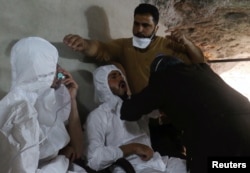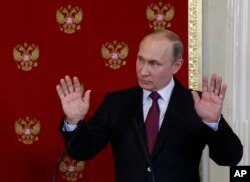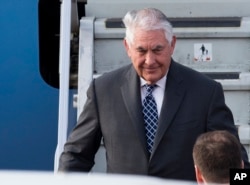The United States has sharply rejected Russian claims that the nerve gas sarin, the agent responsible for scores of deaths in Syria last week, was the inadvertent result of an airstrike on a rebel-held munitions depot. A U.S. report says it is clear the chemical-weapons assault was a deliberate attack on civilians.
The National Security Council released a report at the White House Tuesday declaring that Syria's “unacceptable” use of outlawed chemical weapons is a clear threat to the world. It accused both Syria and Russia of attempting to “confuse the world community about who is responsible for using chemical weapons against the Syrian people,” both on this occasion and previously.
The NSC called on the international community to speak out and make clear that “this behavior will not be tolerated,” although it did not specify possible consequences.
Security Council prepares to vote
At the United Nations, the United States, Britain and France look set to go ahead with a revised Security Council resolution on Wednesday — even though such an effort is expected to be vetoes by Russia.
At a White House briefing in Washington, U.S. national-security officials said Moscow, a key ally of Syrian President Bashar al-Assad, in engaged in “a very clear campaign to obfuscate the nature of the attack.” They cited evidence, such as images of charred roadway showing that the gas shells dropped from the sky on April 4 landed in the middle of a street, not on a building, as Damascus and the Kremlin have claimed.
The American officials said Syria has ignored its agreement in 2013 to dismantle its stockpiles of chemical weapons. “We know the Syrian regime has sarin gas,” one official said, speaking on background. “We are confident the rebels (fighting Assad's government) don't have sarin.”
The clear-cut nature of this month's sarin attack should be seen as “an opportunity for Russia to end its disinformation campaign” about Syria's use of banned weapons. Separately, Turkey announced Tuesday that its test have confirmed the deadly nerve gas sarin was used in the attacks that killed about 90 people and sickened hundreds more.
What of Russia's role in attack?
Ankara's health minister said blood and urine samples were examined during autopsies on three victims of the gas attacks whose bodies were brought in from Syria's Idlib province. The World Health Organization and the Organization for the Prohibition of Chemical Weapons participated in the post-mortem examinations.
Despite the growing agreement about Syria's tactics, there was no clarity on the question of whether, or to what extent, Russia colluded with Syria in carrying out the attack. White House spokesman Sean Spicer said U.S. intelligence officials have not been able to come up with a “consensus” on that issue.
Russian President Vladimir Putin has called for a U.N. investigation of the chemical-weapons attack, which prompted U.S. naval forces to fire 59 Tomahawk cruise missiles at the Syrian air base believed to be the source of the sarin. President Donald Trump approved the missile attack last week.
Putin contended the U.S. staged “provocations” to bolster its charges against Syria, although gave no details or evidence for his statement. The Kremlin leader also claimed Washington is planning a new missile launch against Syria, which supposedly would target an area south of the capital, Damascus, “where they (the Americans) are planning to again plant some substance and accuse Syrian authorities” of using chemical weapons.
Tillerson-Putin meeting uncertain
Putin's condemnation of the United States came as the American secretary of state, Rex Tillerson, arrived in Moscow Wednesday for talks with Foreign Minister Sergei Lavrov. Tillerson said he hopes Moscow will withdraw its support for Assad as a consequence of last week's chemical attack.
“We want to relieve the suffering of the Syrian people,” Tillerson said. “Russia can be a part of that future and play an important role. Or Russia can maintain its alliance” with Syria and Iran.
There are no scheduled plans for Tillerson to meet with Putin, but Russian media outlets, citing unnamed sources, said such a meeting will occur.
At the United Nations, Britain, France and the United States worked on a revised draft resolution condemning the chemical weapons attack. A similar attempt last week ended in acrimony between the three powers and Russia, and was followed by the U.S. missile strike on the Syrian air field.
Wednesday UN vote seen
A revised version of the proposed resolution has been circulated among council members, and diplomats said they expect a vote Wednesday afternoon.
“Our draft resolution seeks first of all to condemn the heinous attack on the 4th of April; second, to require full cooperation by all the parties with the investigations being run by the OPCW and the JIM (Joint Investigative Mechanism); and thirdly, to ensure that there is full accountability,” British Ambassador Matthew Rycroft told reporters.
He said they drafted the resolution with the intention of achieving consensus among the 15 council members. “I find it very hard to understand how any member of the Security Council could vote against any part of that resolution,” Rycroft said, but diplomats said a Russian veto is likely, even if China abstains.
If Russia blocks the measure, it would be the eighth time it has used its council veto to protect Syrian President Bashar al-Assad during the six-year-long civil war.
Veto or not, an international investigation is already fully mandated under existing council resolutions, and could go ahead. The proposed resolution seeks to strengthen Syrian government cooperation with investigators.







